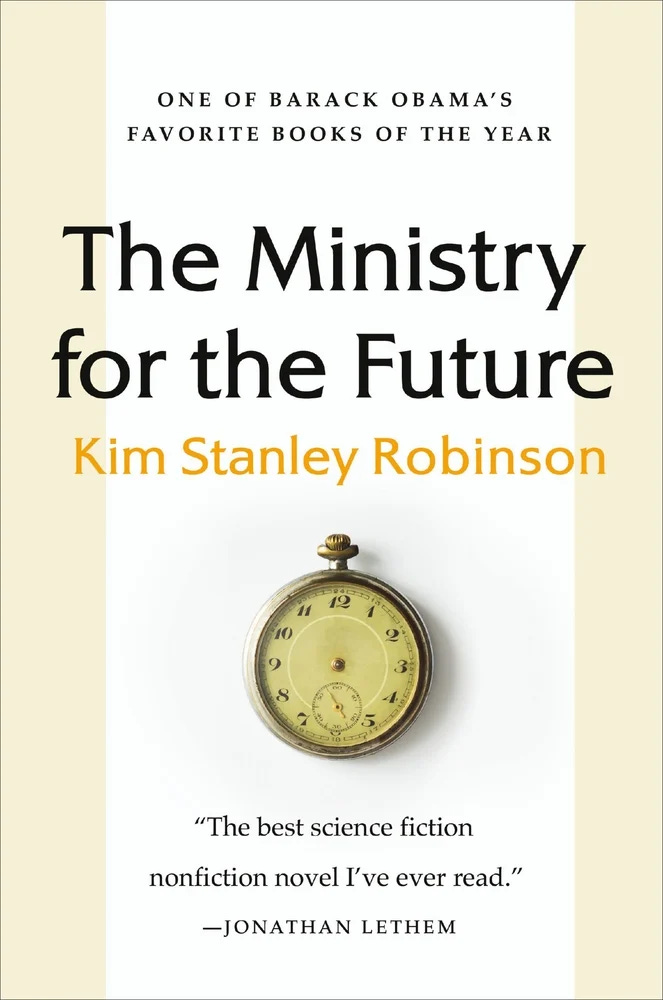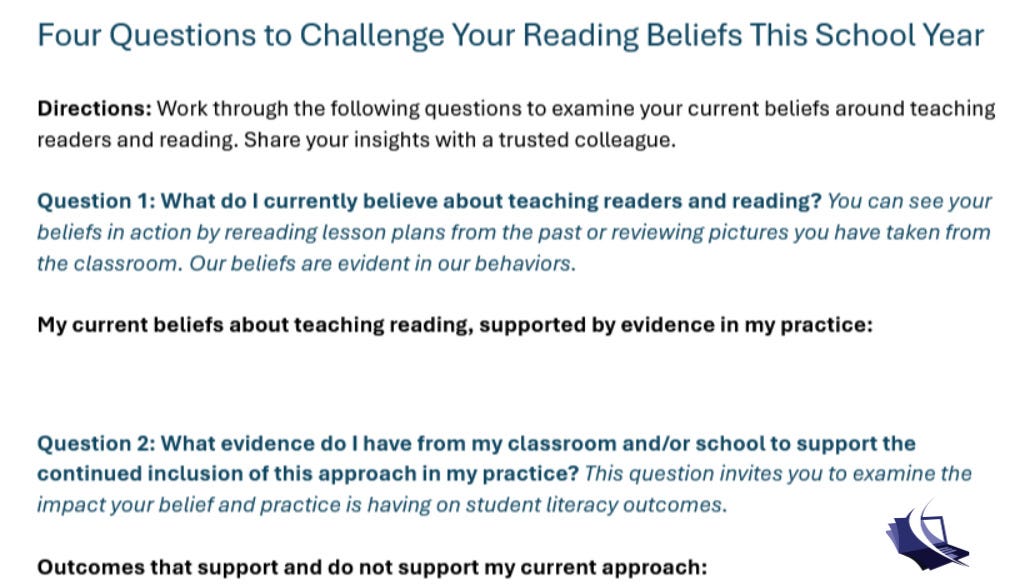Four Questions to Challenge Your Reading Beliefs
On the importance of putting your literacy ideology to the test
We all have an ideology, and this is a good thing. So much information pours into the mind, ranging from sensory experience to discursive and mediated inputs of all kinds, that some kind of personal organizing system is necessary to make sense of things in ways that allow one to decide and to act.
Kim Stanley Robinson, The Minstry for the Future
I just finished The Ministry of the Future, an environmental science fiction novel by Kim Stanley Robinson. In the near future, a catastrophic heat wave spurs the entire world to finally take collective action against climate change.1
This change didn’t happen without obstacles, nor was it a quick turnaround. The process took many years to start seeing the outcomes needed, in particular the decline of carbon dioxide in the atmosphere.
What made this collective change across many countries possible wasn’t simply mandates or political maneuvers. People had to shift their beliefs about the urgency and the reality of the situation. The organizations and leaders created the conditions to facilitate this change, for example by renorming social agreements, rethinking the incentive system around carbon, and additional ways of influencing people’s behaviors for the better.
Just as global climate action required examining deeply held beliefs about economics and lifestyle, improving literacy instruction requires us to examine our beliefs about how children learn to read. Neither are straightforward or easy.
We see the change we have to make, such as scaling more effective instructional practices, and it can seem insurmountable.
We become overwhelmed by both the sheer number of students not succeeding as readers and writers, and by thinking about how to help teachers shift their beliefs and practices toward those more promising practices.
Not knowing where to start or having a clear destination of where the school is headed, we default to simply buying a program and hoping that this resource will be the fix.
A place to start, which can also be a destination, is to guide the staff to examine their beliefs around literacy instruction.
We all operate from a set of beliefs about how students learn to read - what we might call our reading ideology. This isn't inherently good or bad; it's simply the organizing system that helps us make decisions in complex classrooms.
Understanding people’s ideologies, and (more importantly) helping colleagues understand what they believe, why they believe it, and how they might shift this set of beliefs is critical to improving schoolwide literacy outcomes. When we can nudge a learning community toward more productive ways of thinking and acting, all students benefit from the improvement. When we see classrooms empowering students as successful readers, writers, and thinkers, we as leaders can finally feel like we are positively influencing the school culture.
Next is a set of questions you can use to begin this shift toward schoolwide literacy excellence. There’s a downloadable worksheet at the end of this article you can use to facilitate this professional learning with your colleagues and yourself.
Four Questions to Challenge Your Reading Beliefs
Directions: Work through the following questions to examine your current beliefs around teaching readers and reading. Share your insights with a trusted colleague.
1. “What do I currently believe about teaching readers and reading?” You can see your beliefs in action by rereading lesson plans from the past or reviewing pictures you have taken from the classroom. Our beliefs our evident in our behaviors.
Example: You use guided reading in your classroom primarily through leveled texts. A corresponding belief might be “Students learn best when supported by reading in small groups with texts at their reading level.”
2. "What evidence do I have from my classroom and/or school to support the continued inclusion of this approach in my practice?" This question invites you to examine the impact your belief and practice is having on student literacy outcomes.
Example: How did your students grow as readers from fall to spring last year? Go beyond oral reading fluency and similar simple measures, such as the number of books they read and how frequently students moved between reading groups.
3. "What is working, and what may not be working?" It’s important to acknowledge the positive intentions we have as we support our students in classrooms. This helps lower our ego when we engage in an honest assessment about the impact of our practices.
Example: Guided reading helps me connect with my students and build relationships with them. However, the majority of my students remained in their leveled reading group since the fall. They also didn’t consistently demonstrate a love for reading evident by the lack of engagement with the classroom library.
4. "What am I feeling right now, and how might I channel these emotions to improve my belief and practice?" It’s important to recognize our emotions. Are we feeling defensive? Excited? Overwhelmed? Curious? Our beliefs intertwine with our identities as teachers and leaders. When we are confronted with the reality that past practices could be improved, we resist the potential change on a personal level. Used more productively, we can view our emotions as a map of where we need to go.
Example: Instead of using only leveled texts, I am going to shift toward more flexible grouping during guided reading. Students will change groups based on data beyond reading levels, including specific skills, engagement, and even what they want to read. My corresponding belief right now is “Students learn best when supported by flexible grouping based on a variety of data points, not just reading levels.”
The goal isn't to abandon everything you believe, but to examine those beliefs honestly and adjust them based on what truly serves your students.
The printable version of this article includes a one-page worksheet to support reflection and renewal. For paid subscribers, I will be hosting a live virtual professional learning experience to facilitate this process as a community on Thursday, August 28 at 5:30pm CST. Invites will go out soon. Join us!
Sidebar: Our universe is currently sending similar signals. For example, blue whales not vocalizing as much, likely from low energy because of the reduction of krill and sardines due to increasing ocean temperatues. Apologies if sharing this is increasing your anxiety.



I love the idea of questioning, challenging beliefs. So much of what I'm seeing these days seems to come from people whose views are unassailable.
I wonder, having never been an admin, whether it would be useful to start from "What do I believe about effective teaching and learning in general?" before narrowing it to “What do I currently believe about teaching readers and reading?” In order to maintain consistency.
I also wonder whether too much time is spent arguing about techniques, when it might be better spent clarifying goals. For some, students who are "disengaged and compliant test passers" might be all they need. Especially if that's what's bosses notice.
I don't see one-size-fits-all, surface level teaching and learning going away until the expectations are different. In fact, those things seem to have made a huge comeback under the guise of "guaranteed and viable".